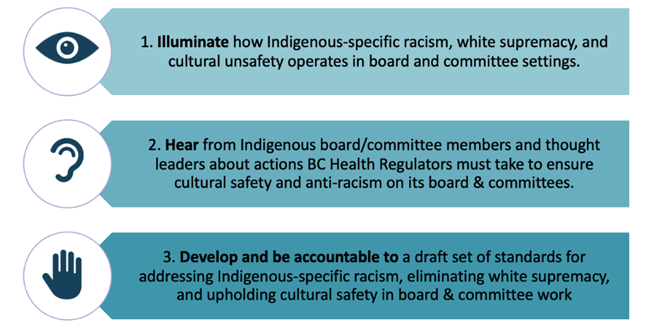The Safe Spaces on Health Regulatory Boards & Committees Research Project
BCCNM is committed to Indigenous-specific anti-racism, cultural safety, and cultural humility. We recognize that systemic Indigenous-specific racism is operating throughout BC’s health system and as leaders in the settler health system, we have a responsibility to eradicate it. Action is required at all levels — governance, operations, clinical care — to identify patterns of systemic Indigenous-specific racism and uphold Indigenous-specific anti-racism.
In 2023, BCCNM sponsored the ‘Safe Spaces Collaborative Research Project’ to name, understand, and strategize to act on systemic racism within health regulatory governance boards and committees. The one-year project was open to all BC health regulatory colleges and was led by Qoqoq Consulting Ltd.
The Safe Spaces project aimed to:

Why a Safe Spaces project?
In response to In Plain Sight’s recommendation to increase Indigenous thought leadership in health care as an act to address Indigenous specific racism — colleges began work to increase Indigenous representation in their governance structures. To bring these Indigenous board and committee members together, BCCNM sponsored the creation of an Indigenous Community of Practice in 2021. Collective insights from the Indigenous Community of Practice, alongside a series of culturally unsafe events which occurred at the BCCNM Board, prompted the organization to initiate a year-long research project to better understand and respond to Indigenous-specific racism experienced by Indigenous board and committee members.
Safe Spaces project details
All participants engaged in a truth and dialogue series guided by Coast Salish Protocols to ask:
We acknowledged both health college CEOs and board chairs and Indigenous Board & Committee Members as experts in the structures, policies, norms, and values of health regulation in BC, and invited them to bring forward insights on how white supremacy and racism are embedded within governance—and how transformation might occur.
Who participated?
- Coast Salish Knowledge Keeper
- 13 Indigenous women serving on health regulatory boards and committees in B.C.
- Registrars/CEOs + Board Chairs from nine colleges
- Team members from Qoqoq Consulting
- Four witnesses
Project Tools
System transformation deliverables included a policy review, followed by co-creation and sharing of a
Playbook to Eliminate Indigenous-Specific Racism & White Supremacy in BC Health College Governance with all participating colleges.
Upcoming: A two-year anniversary relational accountability event is planned for June 2025.